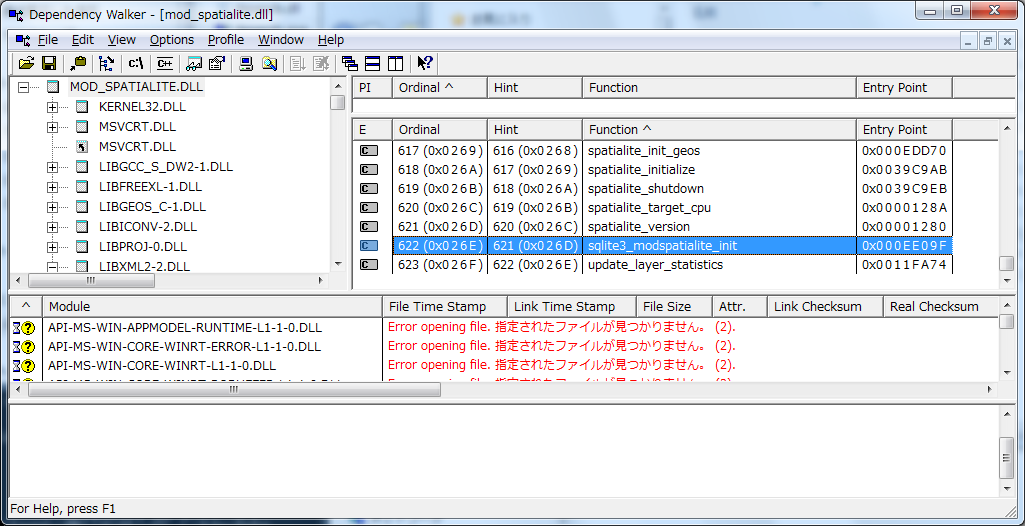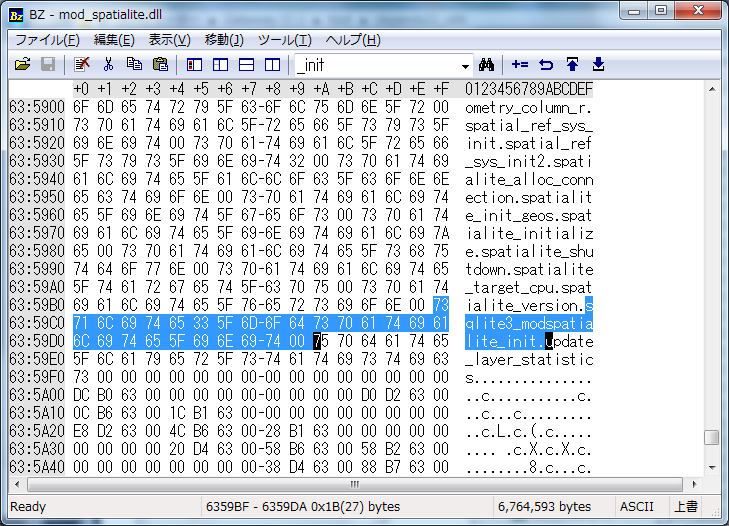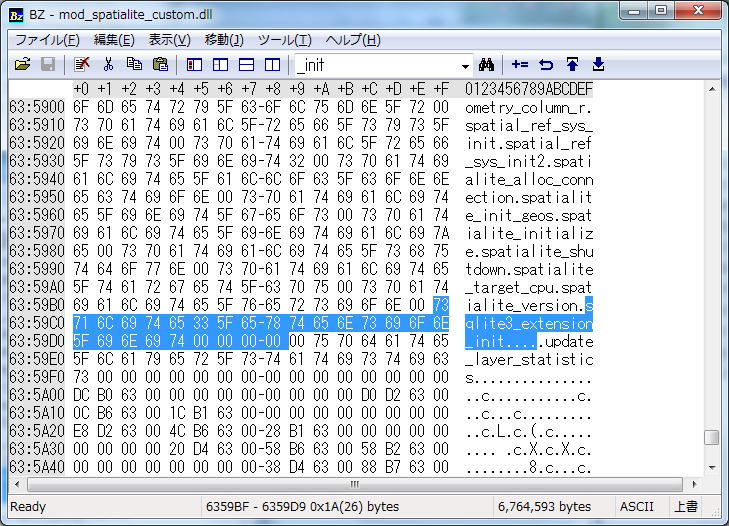目的
この記事ではPHPでSpatialiteを使う方法について解説します。
Spatialiteのビルドなどについては下記を参考にしてください。
地図とかの空間情報をSQLiteに格納するSpatiaLiteを使用してみる
http://qiita.com/mima_ita/items/64f6c2b8bb47c4b5b391
最終目的としては以下のコードが動作することを目標とします。
<?php
class MyDB extends SQLite3
{
function __construct()
{
$this->open(':memory:');
}
}
$ver = SQLite3::version();
var_dump($ver);
$db = new MyDB();
if (!$db->loadExtension('mod_spatialite.dll')) {
exit();
}
# reporting some version info
$rs = $db->query('SELECT sqlite_version()');
while ($row = $rs->fetchArray())
{
print "SQLite version: $row[0]" . PHP_EOL;
}
$rs = $db->query('SELECT spatialite_version()');
while ($row = $rs->fetchArray())
{
print "SpatiaLite version: $row[0]" . PHP_EOL;
}
$db->exec('SELECT InitSpatialMetaData()');
$db->exec('CREATE TABLE foo (name TEXT)');
$db->exec('SELECT AddGeometryColumn("foo", "Geometry", 0, "POINT", 2)');
# SQLite 3.7.17以降じゃないとRTreeインデックスは作れない
if ($ver->versionNumber < 3007017) {
print "RTree-Index is Not supported. (< 3.7.17)" . PHP_EOL;
} else {
$db->exec('SELECT CreateSpatialIndex("foo", "Geometry")');
}
$db->exec('INSERT INTO foo VALUES("test1", GeometryFromText("POINT(140 30)"))');
$db->exec('INSERT INTO foo VALUES("test2", GeometryFromText("POINT(135 33)"))');
$rs = $db->query('SELECT name, AsGeoJson("Geometry") AS geo FROM foo');
while ($row = $rs->fetchArray())
{
var_dump($row);
}
$db->close();
?>
前提
PHP5.5以降でないとloadExtensionは動作しません。
少なくとも、PHP5.3では基本無理(※)で、PHP5.6ではいけました。
なので、特に制約がなければPHPの最新を用意してください。
なお、基本無理というのは、機能を落として、なんやかんやすれば、なんとかなりはします。
あと、Windowsユーザの人は苦労します。LinuxとかMacのパスの区切りが"/"の環境だと比較的楽です。
php.iniの修正
loadExtensionを用いて拡張モジュールを使う場合、php.iniを修正して、拡張モジュールを読み込めるようにする必要があります。
Windowsの場合はデフォルトでSQLite3が無効になっている場合もあるのでphp.iniのコメントアウトを外してください。
extension=php_sqlite3.dll
次に拡張モジュールを格納しているフォルダを指定します。
[sqlite3]
sqlite3.extension_dir =C:\tool\spatialite\mod_spatialite-4.2.0-win-x86
PHPのSQLiteでは、ここで指定したフォルダ以外から拡張モジュールをロードすることはできません。
あとは環境変数のPATHに上記のフォルダを指定すれば、ラッキーガイな環境では動作します。お疲れ様でした。
以下のエラーが出る場合は、ここからが本当の地獄です。
PHP Warning: SQLite3::loadExtension(): 指定されたプロシージャが見つかりません。
何でエラーになるか
おそらく、ここでエラーになるのはPHPが使用しているSQLiteのバージョンが古いか、Windowsユーザの人だと思います。
なぜエラーになるかの前にSQLiteの拡張モジュールのエントリーポイントが関係しています。
Run-Time Loadable Extensions
http://www.sqlite.org/loadext.html
本来のSQLiteのload_extensionはload_extension(X,Y)となっており、2つの引数を取ります。Xがモジュール名でYがエントリーポイントの関数名となります。
このYは省略可能で、PHPのloadExtension関数の場合、省略して実行されています。
この省略された場合の挙動は次のようになります。
・もし省略されている場合は sqlite3_extension_init を使用する
・これでロードできない場合は、最後の"/" 以降を使用する。この時、接頭語のlibは除去し、アルファベットのみを小文字にし、拡張子は考慮しない。
具体的には次のようになります。
"/usr/lib/libmathfunc-4.8.so" ⇒ "sqlite3_mathfunc_init".
"./SpellFixExt.dll" ⇒"sqlite3_spellfixext_init"
なお、mod_spatialite.dllのエントリーポイントは「sqlite3_modspatialite_init」となっています。
これについては、Dependency.Walkerで調べるかソースコード読んでください。

http://www.dependencywalker.com/
つまり、PHPからloadExtensionを行った場合にエントリーポイントを「sqlite3_modspatialite_init」に変換できていないのが、このエラーの原因となります。
何故、古いPHPではsqlite3_modspatialite_initというエントリーポイントを取得できないか
PHP5.4以前の場合は話は簡単です。古いSQLiteの仕様にはこの機能がなかったものと推測できます。
実際、PHP5.4にバンドルされているSQLiteのコードに、該当の処理は存在しません。
static int sqlite3LoadExtension(
sqlite3 *db, /* Load the extension into this database connection */
const char *zFile, /* Name of the shared library containing extension */
const char *zProc, /* Entry point. Use "sqlite3_extension_init" if 0 */
char **pzErrMsg /* Put error message here if not 0 */
){
// 略
if( zProc==0 ){
zProc = "sqlite3_extension_init";
}
handle = sqlite3OsDlOpen(pVfs, zFile);
if( handle==0 ){
if( pzErrMsg ){
*pzErrMsg = zErrmsg = sqlite3_malloc(nMsg);
if( zErrmsg ){
sqlite3_snprintf(nMsg, zErrmsg,
"unable to open shared library [%s]", zFile);
sqlite3OsDlError(pVfs, nMsg-1, zErrmsg);
}
}
return SQLITE_ERROR;
}
xInit = (int(*)(sqlite3*,char**,const sqlite3_api_routines*))
sqlite3OsDlSym(pVfs, handle, zProc);
if( xInit==0 ){
if( pzErrMsg ){
*pzErrMsg = zErrmsg = sqlite3_malloc(nMsg);
if( zErrmsg ){
sqlite3_snprintf(nMsg, zErrmsg,
"no entry point [%s] in shared library [%s]", zProc,zFile);
sqlite3OsDlError(pVfs, nMsg-1, zErrmsg);
}
sqlite3OsDlClose(pVfs, handle);
}
return SQLITE_ERROR;
}else if( xInit(db, &zErrmsg, &sqlite3Apis) ){
if( pzErrMsg ){
*pzErrMsg = sqlite3_mprintf("error during initialization: %s", zErrmsg);
}
sqlite3_free(zErrmsg);
sqlite3OsDlClose(pVfs, handle);
return SQLITE_ERROR;
}
見てわかる通り、sqlite3OsDlSymでxInitが取得できなかった場合にエラーとして返しています。
一方、PHP5.5では、xInitが取得できなかった場合に、代替のエントリーポイントを取得する処理が記述されています。
static int sqlite3LoadExtension(
sqlite3 *db, /* Load the extension into this database connection */
const char *zFile, /* Name of the shared library containing extension */
const char *zProc, /* Entry point. Use "sqlite3_extension_init" if 0 */
char **pzErrMsg /* Put error message here if not 0 */
){
// 略
xInit = (int(*)(sqlite3*,char**,const sqlite3_api_routines*))
sqlite3OsDlSym(pVfs, handle, zEntry);
/* If no entry point was specified and the default legacy
** entry point name "sqlite3_extension_init" was not found, then
** construct an entry point name "sqlite3_X_init" where the X is
** replaced by the lowercase value of every ASCII alphabetic
** character in the filename after the last "/" upto the first ".",
** and eliding the first three characters if they are "lib".
** Examples:
**
** /usr/local/lib/libExample5.4.3.so ==> sqlite3_example_init
** C:/lib/mathfuncs.dll ==> sqlite3_mathfuncs_init
*/
if( xInit==0 && zProc==0 ){
int iFile, iEntry, c;
int ncFile = sqlite3Strlen30(zFile);
zAltEntry = sqlite3_malloc(ncFile+30);
if( zAltEntry==0 ){
sqlite3OsDlClose(pVfs, handle);
return SQLITE_NOMEM;
}
memcpy(zAltEntry, "sqlite3_", 8);
for(iFile=ncFile-1; iFile>=0 && zFile[iFile]!='/'; iFile--){}
iFile++;
if( sqlite3_strnicmp(zFile+iFile, "lib", 3)==0 ) iFile += 3;
for(iEntry=8; (c = zFile[iFile])!=0 && c!='.'; iFile++){
if( sqlite3Isalpha(c) ){
zAltEntry[iEntry++] = (char)sqlite3UpperToLower[(unsigned)c];
}
}
memcpy(zAltEntry+iEntry, "_init", 6);
zEntry = zAltEntry;
xInit = (int(*)(sqlite3*,char**,const sqlite3_api_routines*))
sqlite3OsDlSym(pVfs, handle, zEntry);
}
このように古いPHPだとバンドルされているSQLiteのエントリーポイントの取得方法が異なるために、エラーになるのです。
何故、Windowsではsqlite3_modspatialite_initというエントリーポイントを取得できないか
次にWindowsではどうして新しいPHPでもエントリーポイントを取得できないか説明します。
PHPはsqlite3.extension_dir で指定したフォルダ名と、loadExtensionで指定したファイル名を組み合わせて、sqlite3LoadExtensionを実行しています。
つまり、sqlite3LoadExtensionに渡されるzFileは次のようになります。
C:\tool\spatialite\mod_spatialite-4.2.0-win-x86\mod_spatialite.dll
UNIXの場合、パスの区切りが「/」なので適切にファイル名を抽出しますが、Windowsだと「\」なので抽出しません。この場合、エントリーポイントとして期待されるのが以下のようになってしまうのです。
ctoolspatialitemod_spatialitewinmod_spatialite
対応策
ようするにエントリーポイントを認識させればいいのです。
残念なことにPHPでは、以下のようなSQLを認めていません。
SELECT load_extension("mod_spatialite", "sqlite3_modspatialite_init")'
PHP_METHOD(sqlite3, loadExtension)
{
php_sqlite3_db_object *db_obj;
zval *object = getThis();
char *extension, *lib_path, *extension_dir, *errtext = NULL;
char fullpath[MAXPATHLEN];
int extension_len, extension_dir_len;
db_obj = (php_sqlite3_db_object *)zend_object_store_get_object(object TSRMLS_CC);
SQLITE3_CHECK_INITIALIZED(db_obj, db_obj->initialised, SQLite3)
if (FAILURE == zend_parse_parameters(ZEND_NUM_ARGS() TSRMLS_CC, "s", &extension, &extension_len)) {
return;
}
# ifdef ZTS
if ((strncmp(sapi_module.name, "cgi", 3) != 0) &&
(strcmp(sapi_module.name, "cli") != 0) &&
(strncmp(sapi_module.name, "embed", 5) != 0)
) { php_sqlite3_error(db_obj, "Not supported in multithreaded Web servers");
RETURN_FALSE;
}
# endif
if (!SQLITE3G(extension_dir)) {
php_sqlite3_error(db_obj, "SQLite Extension are disabled");
RETURN_FALSE;
}
if (extension_len == 0) {
php_sqlite3_error(db_obj, "Empty string as an extension");
RETURN_FALSE;
}
extension_dir = SQLITE3G(extension_dir);
extension_dir_len = strlen(SQLITE3G(extension_dir));
if (IS_SLASH(extension_dir[extension_dir_len-1])) {
spprintf(&lib_path, 0, "%s%s", extension_dir, extension);
} else {
spprintf(&lib_path, 0, "%s%c%s", extension_dir, DEFAULT_SLASH, extension);
}
if (!VCWD_REALPATH(lib_path, fullpath)) {
php_sqlite3_error(db_obj, "Unable to load extension at '%s'", lib_path);
efree(lib_path);
RETURN_FALSE;
}
efree(lib_path);
if (strncmp(fullpath, extension_dir, extension_dir_len) != 0) {
php_sqlite3_error(db_obj, "Unable to open extensions outside the defined directory");
RETURN_FALSE;
}
/* Extension loading should only be enabled for when we attempt to load */
sqlite3_enable_load_extension(db_obj->db, 1);
if (sqlite3_load_extension(db_obj->db, fullpath, 0, &errtext) != SQLITE_OK) {
php_sqlite3_error(db_obj, "%s", errtext);
sqlite3_free(errtext);
sqlite3_enable_load_extension(db_obj->db, 0);
RETURN_FALSE;
}
sqlite3_enable_load_extension(db_obj->db, 0);
RETURN_TRUE;
}
loadExtensionをするまえにsqlite3_enable_load_extensionで拡張モジュールを許可して、処理が終了したら不許可にしていることがわかります。
つまり、PHPの思想としてはSELECTでload_extensionはさせないというものになります。
これ以外に回避する方法は3つあります。
1つ mod_spatialiteのソースコードでエントリーポイント名を変更する
2つ mod_spatialite.dllをバイナリエディタで開いて、エントリーポイント名を改ざんする
3つ sqliteのコードで「\」も考慮するようにする。
以上の3つです。
mod_spatialiteのソースコードでエントリーポイント名を変更する
これに関しては未検証です。
ただ、エントリーポイントを修正するのは楽でも、mod_spatialiteをWindowsでビルドする環境を作るのはしんどいと思います。
mod_spatialite.dllをバイナリエディタで開いて、エントリーポイント名を改ざんする
sqlite3_modspatialite_initという文字をバイナリエディタで検索して、sqlite3_extension_initに置き換えます。この際、足りないところには00で埋めます。削除したりすると、アドレスが変わるので動作しなくなります。
この方法で対応した場合、RTreeインデックスを使用できなくなることに目をつぶればPHP5.3でもmod_spatialiteを利用できます。
sqliteのコードで「\」も考慮するようにする。
そもそも論として、sqlite3.cを以下のように修正すれば「\」でもファイル名のみを抽出します。
if( xInit==0 && zProc==0 ){
int iFile, iEntry, c;
int ncFile = sqlite3Strlen30(zFile);
zAltEntry = sqlite3_malloc(ncFile+30);
if( zAltEntry==0 ){
sqlite3OsDlClose(pVfs, handle);
return SQLITE_NOMEM;
}
memcpy(zAltEntry, "sqlite3_", 8);
// Windows 対応
//for(iFile=ncFile-1; iFile>=0 && zFile[iFile]!='/'; iFile--){}
for(iFile=ncFile-1; iFile>=0 && (zFile[iFile]!='/' && zFile[iFile]!='\\'); iFile--){}
あとはPHPのソースコードをWindowsでビルドする方法ですが、以下を参考にすると良いでしょう。
PHP拡張モジュールを Windows でビルド
http://ngyuki.hatenablog.com/entry/20120625/p1
PHP を Windows でビルド
http://ngyuki.hatenablog.com/entry/20120701/p1
php_sqlite3.dllを作成するには次のようなconfigureでいけました。
configure --disable-all --enable-cli --enable-cgi --with-sqlite3=shared
nmake
一応x86でPHP5.6のSQLiteをビルドしたものを以下に置きます。
http://needtec.sakura.ne.jp/release/php_sqlite3.zip
まとめ
このように、SpatialiteをPHPで使うにはかなり苦労が必要です。

